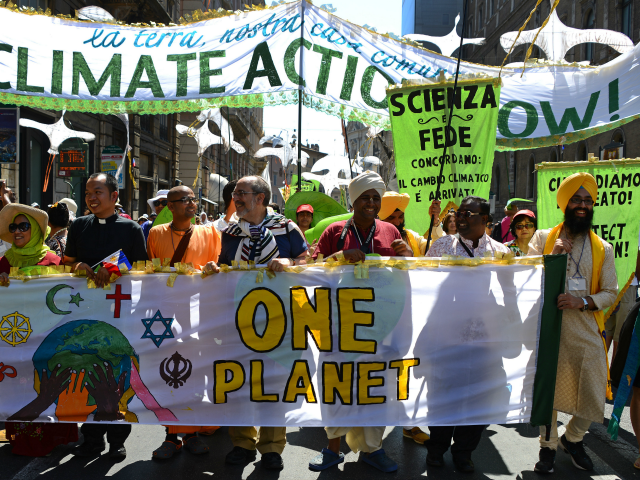The Vatican’s Permanent Observer to the United Nations in Geneva said Monday that climate change has a “disproportionate impact on poor people and poor communities” and called on nations to integrate “questions of justice in debates on the environment.”
“While climate change and air pollution strike down the rich and poor alike, there is a growing evidence of its disproportionate impact on poor people and poor communities,” Vatican Archbishop Ivan Jurkovič told the U.N. Monday. “Poverty causes people to rely on polluting energy sources for their basic needs, and poverty increases the health risks associated with their use.”
“Thus, a proper ecological approach always includes a social approach. For the construction of the present and future of our planet, the international community is called to sincere and productive dialogue by integrating questions of justice in debates on the environment,” the archbishop said.
In his speech, the Holy See representative fell into a common error of associating “climate change” with air pollution.
Archbishop Jurkovič correctly noted that “globally around 4.2 million premature deaths are linked to ambient air pollution that can lead to heart disease, stroke, chronic obstructive pulmonary disease, lung cancer, and acute respiratory infections in children” according to studies by the World Health Organization (WHO).
“More than 90 per cent of the world’s population, over 6 billion people, lives in regions that exceed WHO guidelines for healthy ambient air quality,” he added.
But then the Slovenian archbishop went on to propose that climate change and air pollution “are closely interlinked because emissions of air pollutants and climate-altering greenhouse gases and other pollutants arise largely from humanity’s use of fossil fuels and biomass fuels, which leads to increased risks of extreme events that affect the social and environmental determinants of health – clean air, safe drinking water, sufficient food and secure shelter.”
In reality, first-world countries such as the United States have remarkably clean air in comparison with other nations (7 times cleaner than China, for instance), despite their dependence on fossil fuels, as WHO itself has determined.
As the prestigious Lancet journal revealed in a landmark 2017 study, air pollution and not carbon dioxide is the greatest environmental cause of disease and death in the world, and yet it is largely ignored in international ecological programs.
In its study, Lancet found that pollution-related diseases were responsible for some 9 million premature deaths in 2015, or nearly 15 times more than from all wars and other forms of violence combined.
Pollution is not only the largest environmental cause of disease and premature death in the world today, the study found, but diseases caused by pollution were responsible for roughly 16 percent of all deaths worldwide — “three times more deaths than from AIDS, tuberculosis, and malaria combined and 15 times more than from all wars and other forms of violence.”
In other words, while there has not been a single documented case of a person dying from carbon dioxide related “global warming,” real pollution of air, water and land is killing an average of 25,000 people each day across the globe.
“Despite its substantial effects on human health, the economy, and the environment, pollution has been neglected, especially in low-income and middle-income countries, and the health effects of pollution are under-estimated in calculations of the global burden of disease,” the Lancet warned.
This health damage from pollution “has particularly been overlooked in both the international development and the global health agendas,” the report continues.
“Although more than 70% of the diseases caused by pollution are non-communicable diseases, interventions against pollution are barely mentioned in the Global Action Plan for the Prevention and Control of Non-Communicable Diseases,” the report declared.
The U.N.’s highly touted Paris Climate Accord, for instance, while decrying the evils of carbon dioxide emissions never once mentioned the word “pollution” in the entire 27-page document.
Environmental activists regularly complain of “carbon footprints” and preach “renewable energy” while insisting that first-world countries be taxed for their carbon dioxide emissions, and yet they are silent regarding the real and present menace that is wiping out millions of human beings around the world: air pollution.
In point of fact, carbon dioxide (CO2) is not a “pollutant” at all, but a colorless, odorless, and completely non-toxic gas. Plants depend on it to live and grow, and human beings draw some into their lungs with every breath they take with no ill effect whatsoever.
Growers regularly pump CO2 into greenhouses, raising levels to three times that of the natural environment, to produce stronger, greener, healthier plants.
Distinguishing the real and present danger of air pollution from the completely separate and debatable issue of “climate change” is a necessary first step toward an honest debate about the environment and its effect on the poor.
Follow Thomas D. Williams on Twitter Follow @tdwilliamsrome

COMMENTS
Please let us know if you're having issues with commenting.